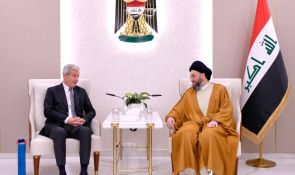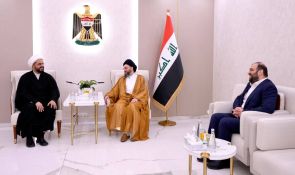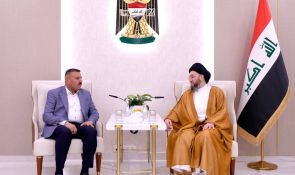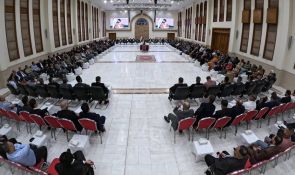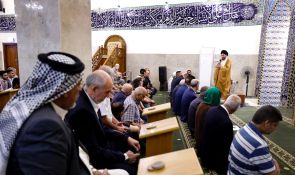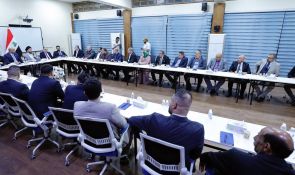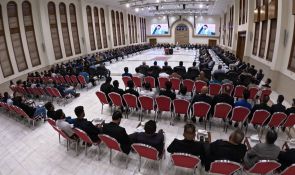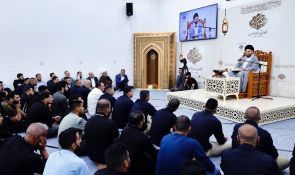Considering the Settlement of the Displaced to be a Red Line, Sayyid Ammar Al Hakim Warns Against Demographic Change and Elimination of Nationalistic and Sectarian Diversity
Sayyid Ammar Al Hakim, head of the Islamic Supreme Council of Iraq, affirmed that displacement is the natural result of the expansion of terrorism and reluctance to fight it, pointing out the failure to devise political solutions that help contain incubators, encourage them to fight terrorism, adhere to a political project that is reassuring to all components, hold on to the land and demand the rights within the constitution and the law. His eminence stated in the speech he delivered at the national conference on forced displacement titled “The Displaced of Iraq: Terror and Absence” sponsored by his office in Baghdad on Saturday, September 13, 2014 and held in the presence of the president of the republic, the prime minister and a number of politicians and local and international organizations: “We see today one third of our dear country under the control of terrorism and organized crime. Millions of our people have been displaced from their cities, villages and houses to other places in their provinces or in other provinces, looking for security and shelter”. His eminence underlined: “We have a great historic and national responsibility. We are witnessing a national humanitarian disaster that requires us to deal with it with respect to the feelings and rights of our displaced people”.
Blind Terrorism Intends to Eliminate Religious and Sectarian Diversity in Regions
Al Hakim stressed, during the conference, the need to invest the regional and international momentum aiming to counter the terrorism of ISIS and reveal to everyone the truths about the gravity of this terrorist group and the targeting of everyone with no exceptions. His eminence insisted that we should be very attentive to the terrorist and criminal policy of ISIS and not to take decisions or steps that would help terrorism reach its main goals of displacing our people, especially that this terrorist group comprises members originating from more than eighty countries who have become experience in crime and who use uncommon methods and tools. He warned that the ultimate goal of blind terrorism is eliminating the demographic, sectarian, religious and nationalistic diversity from the regions it targets. His eminence also warned against serious disasters and collapses in case the terrorist cancer spreads to these countries. He stressed in the same time the need to provide care to our displaced citizens and called to remember that settlement is a red line and not to take any emotional and immature measures that could lead to involuntary settlement.
During his speech at the conference, his eminence asked the government to continue providing the financial grant to the displaced, to establish temporary camps to shelter them, to instruct the departments of nationality and passports to facilitate the issuance of identification documents lost by the displaced, not to fail students of the past school year in view of the psycho-social circumstances they went through, and to provide care to women, children and persons with special needs.
The Problems of the Displaced Should be Handled in a Practical Manner
In a related context, Sayyid Ammar Al Hakim called for the development of a comprehensive security plan to protect the displaced in certain insecure displacement areas, and for the provision of safe humanitarian passages to get the displaced out of the areas witnessing military operations until all the regions where the terrorists of ISIS are present are liberated through the collaboration among the courageous armed forces and the popular and tribal forces eager to get the displaced back to their areas of residence. His eminence assured his full support of the new government in its use of real methods and procedures that are far from slogans and biddings and in its practical and systematic way of dealing with the daily problems of millions of displaced. His eminence also called on the conference attendees to submit pragmatic suggestions and mechanisms that could contribute in solving the problems of the displaced and of the regions they fled to. He finally warned against the problems that displacement areas are experiencing and the problems resulting from the competition over the resources, the pressure on the already weak and collapsing infrastructure and the occupation of public buildings and institutions.
We Call on to Create a Higher Disaster and Crisis Committee
He also called on to follow the model of many countries and create a higher disaster and crisis committee that would deal with emergencies, crises and natural human disasters, explaining that the first step is to estimate the size of the problem and its extent, which requires an urgent and accurate statistics and survey of the displaced Iraqis to know how big the problem to be solved is.
For his part, the speaker of the Iraqi Parliament, Mr. Salim al-Jabbouri, said according to the statistics, there are about 1,800,000 displaced, calling on the government to assume its responsibilities in this regard. In his speech delivered during the conference on his behalf by Mr. Alwan al-Jabbouri, he said: "In the current conditions the Iraqis go through, there is dire need to make concerted efforts and to convey a message that the fear from expulsion cannot divide the country, and to show that the evil forces cannot compromise our determination and have never been able to affect our love for life". "The displaced Iraqis are living in schools and settlements and this is why we should pull together and prompt the government to fully play its role in relieving the suffering of the displaced", he added.
On the other hand, Mr. Haider al-Abadi said during the conference, "the international support of Iraq in striking the ISIS and the preparations made by the states and the international community came after many years of tardiness, and I mean particularly the neighboring countries". Al-Abadi also praised the efforts of the international organizations in providing them with the human aid, stating "The government's effort must constitute the guarantee for the displaced Iraqis whether by ensuring lodgings or the means of subsistence for them. This is why we made sure that this constitutes a top priority, not to mention that the governmental program we have presented tackles the displacement issue."
In addition, the head of the Kurdistan region said in a speech delivered on his behalf by Mr. Babaker Zibari that the aids supplied to the displaced Iraqis in Kurdistan are not enough and the federal government must increase its contribution to support the displaced.
As for the deputy prime minister and the head of the higher committee for sheltering the displaced Iraqis, Mr. Saleh al-Mutlaq, he maintained that the aids provided by the international community are still unavailable and are much less than what is needed and that some countries offered much more aids than the United Nations did.
Mr. Saleh al-Mutlaq had also a word in the conference: "We thank this conference which concerns a big segment of the Iraqi population who was forcibly displaced in different regions of Iraq and the difficulty in delivering the aids, and perhaps Iraq is the only country which has been witnessing successive displacements, fall of cities and quick movement of the displaced Iraqis from one place to another."
For his part, Ayman Bajlan, the official in charge of the displacement issue at the Commission said, "the Commission is asking the Iraqi government to consider those who died because of displacement as martyrs and to grant them all the rights and privileges", adding that the lack of accurate official statistics of the number of the displaced Iraqis impedes the supply with the aids".
The representative of the UN Secretary General, Nikolai Miladinov, said no country or organization can give as the Iraqi people did, praising the role of the religious authority in bringing relief to the displaced people.
"Iraq is writing one of the pages of its history by giving an example of unity and rule of the state of law", he added. "We stand by the Iraqi people who is helping more than one million persons who have been compulsorily displaced". Here he extended his thanks and appreciation to the citizens who hosted the displaced Iraqis in all the Iraqi provinces. According to him, the ISIS is a threat to Iraq, the region and the world and the Kurdistan region is facing financial problems because of the flow of displaced people.
The Commission for Human Rights also asked the Iraqi government to consider those who died as a result of the expulsion as martyrs and to grant them all the rights due to the martyrs.


